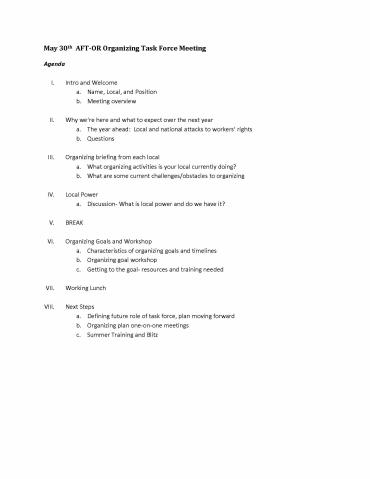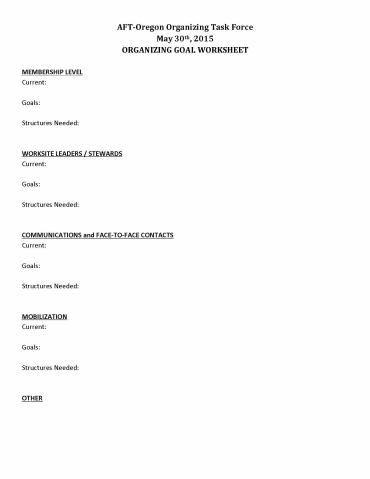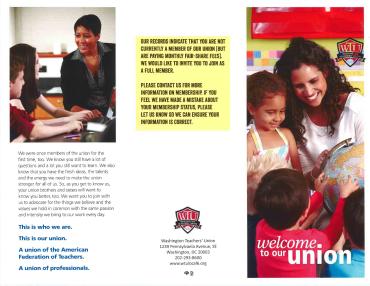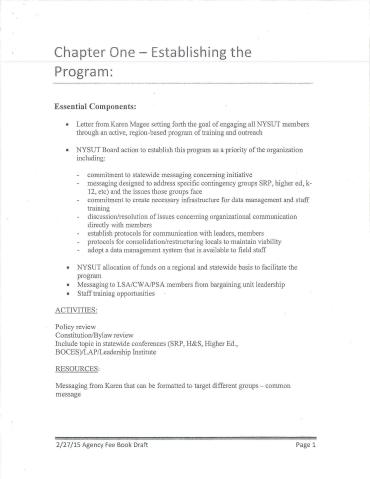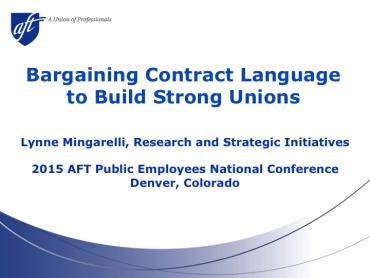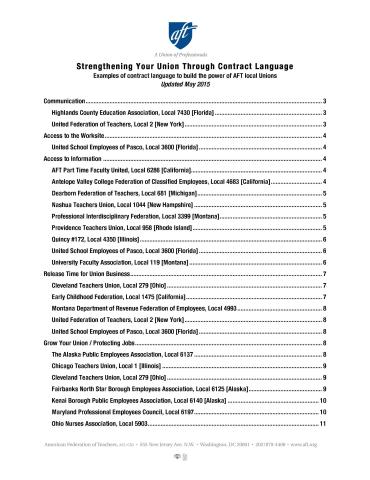Campaign Resource Update
In Oregon, cooperation between locals and statewide affiliates is kick-starting outreach to fair-share payers...
In our nations capital, the WTU has woven fair-share payer outreach into everything the union does...
Special Supplement: From New York State United Teachers, an impressively detailed look at launching a statewide fair-share-to-membership campaign.
Bargaining Contract Language to Build Strong Unions
If you are looking for the first edition of the Campaign Resource Update, you can find it here.
Oregon
In Oregon, locals are working with their state organization to organize fair-share payers and identify training and resource needs.
They had a big meeting on May 30th - statewide and many local affiliates. Here's what they covered:
- Overview on the attacks on our members, both locally and nationally
- Sharing session on current organizing activities and challenges
- Defining local power and if they feel they have it
- Developing 12 month internal organizing goals with their organizers and field reps
- Commiting to recruit members to attend upcoming training opportunities and participate in organizing activities
- Commiting to hold regular statewide meetings and regular follow-up with staff to develop and implement organizing plans
Want some more detail?
Here is the agenda from that May 30th meeting.
Here is the blank internal organizing plan template.
Washington Teachers Union
In the District of Columbia,the Washington Teachers Union (WTU) has made a priority of bringing fair-share payers into full membership. They incorporated these efforts into nearly every thing they do. What does that look like?
They developed a brochure to hand to all new members and potential members, as a way of helping new and potential members understand what their union is about, and as an ice-breaker for workplace conversations among building reps and potential members.
As a provider of high quality professional development, WTU publicized to that professional development sessions were available to all, but were significantly discounted for full-members. They built social events around signing up fair-share payers. And they held member appreciation nights, in which full-dues member received discounts to sporting events.
To support these efforts, all WTU staff were trained in outreach efforts to fair-share payers. The trainings put special focus on listening to the concerns of fair-share payers, connecting those concerns to the priorities of WTU, and moving fair-share payers to take action.
The results speak for themselves. WTU's reports organizing 1,800 members since June 2014.
Campaign Resource Update. Special Supplement.
This week, from New York State United Teachers (NYSUT), an impressively detailed look at launching a statewide fair-share-to-membership campaign…
This document, reflecting the full support and commitment of NYSUT’s officers to address the fair-share issue in New York, gives a state federation perspective on how to organize a comprehensive fair-share-to-membership campaign.
You might note a couple things as you read through:
- The document doesn’t dwell on fair-share as an isolated problem. Instead, it focuses on indicators of deficits in the local union program. The understanding is that these deficits contribute to a lack of member engagement, with a large percentage of fair-share payers being just one indicator.
- Sensitivity to different constituencies – their circumstances and needs – is emphasized throughout.
- At every level of the union, buy-in among elected leaders is the first item of business.
- Also, at each level of the union there is ‘assessment’ and ‘adjustment.’ For example: 'create an assessment program to monitor, report, and adjust the program for locals as they move through the process' and 'institute a reporting routine to ensure that all stakeholders are actively engaged in the process.'
- Throughout there is discussion of a ‘shift’. The shift is about changes in internal relationships to ensure the primacy of bringing fair-share payers into membership. This potentially includes shifting staff roles, and includes staff input into the process of defining the new parameters.
What are the takeaways from running their program for the last year? Mark Chaykin, NYSUT Director of Field Services, has this to say:
Start asking: ‘In a year’s time we have signed up over 5,000 former fair-share payers. Mostly, they thought they were members.’
Clean up the data: ‘We are also finding that people we thought were fair-share payers were really members - change of name due to marriage or divorce was biggest reason for this.’
Take a holistic approach: ‘When working with locals in building their plan of action, we need to focus on the fee payers, of course. But we also need to prioritize local unions that have those indicators of weakness in membership engagement. Regardless of their current fair-share numbers right now, if the rules change then there are going to be problems in those locals that have not built strong relationships with their members.’
End every presentation to local leaders with these words: 'Non-member to Members, Members to Activists, Activists to Leaders.'
Bargaining Contract Language to Build Strong Unions
AFT’s maintains a database of affiliate contracts. This allows us to search for affiliate contract language on various topics. AFT’s Research and Strategic Initiatives Department used the contract database to develop these helpful documents.
The first document is a PDF of a PowerPoint presentation – Bargaining Contract Language to Build Strong Unions. From ‘access to worksites’ to ‘union release time’ this presentation lays out what we need in our contract language in order to support key union functions.
The second document, Strengthening Your Union Through Contract Language, provides the actual contract language. It is arranged by topic, and in each instance there are multiple examples of sample contract language. The excerpts come from contracts covering a range of AFT constituencies – teachers, PSRPs, higher education, healthcare, and public employees – in workplaces north, south, east, and west.
The documents are downloadable, but require a password. Email Richard Ford at rford@aft.org if you’ve lost your password and want access.

